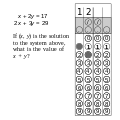Multiple choice
Multiple choice questions ask people to choose the answer from a list. Tests, elections, and surveys can use multiple choice questions. Frederick J. Kelly made the first multiple choice questions in 1914 at the University of Kansas. This testing method is popular in the United States.[1]
Method
Multiple choice questions have 2 parts. The first part is called the stem, which is a problem to be solved or a sentence needing completion. The question is usually straightforward (only a few options) and it needs review to get the right answer. The second part, the options, have 2 variations, or differences. The first is called the key, and is the correct answer. The other answers are called distractors.[2] They are usually very close to the actual answer so they can confuse people. Multiple choice questions are used on standardized tests, and they aren't always questions. They may be math equations, incomplete sentences, or other things.
Examples
1. [math]\displaystyle{ 2+2= }[/math]
A) 0
B) 22
C) 4
D) 2
2. Where is the Eiffel Tower?
A) London
B) Paris
C) Singapore
D) New York
Correct answers:
1 C
2 B
Multiple Choice Media
A machine-readable bubble sheet on a multiple choice test
References
- ↑ Phelps, Richard (Fall 1996), "Are US Students the Most Heavily Tested on Earth?", Educational Measurement: Issues and Practice, 15 (3): 19–27, doi:10.1111/j.1745-3992.1996.tb00819.x
- ↑ Kehoe, Jerard (1995). Writing multiple-choice test items Archived 2017-12-02 at the Wayback Machine Practical Assessment, Research & Evaluation, 4(9). Retrieved February 12, 2008.

